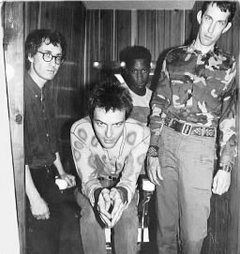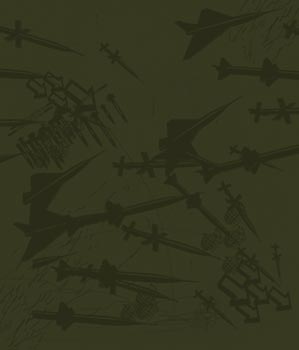|
|
|
 |
Punk People |  |
|
people who made punk wht it is and bands in the history of the making Black Flag was a hardcore punk group formed in 1976 in southern California, largely as the brainchild of Greg Ginn, guitarist, primary songwriter and sole continuous member through multiple personnel changes. Black Flag forged a unique sound early on that mixed the raw simplicity of The Ramones with atonal and microtonal guitar solos and frequent tempo shifts. Over this could be heard lyrics—mostly written by Ginn—about isolation, neurosis and paranoia, themes which did not disappear when Henry Rollins took on the role of lead singer in 1981. Most of the band's material was released on Ginn's independent label, SST Records. While Black Flag were--and remain--very respected among their underground culture, their music has not been the stylistic model one might expect, in spite of their formidable reputation. Rather, their influence was seen primarily in their tireless promotion of a self-controlled DIY aesthetic. They're often regarded as pioneers in the movement of underground do-it-yourself record labels that flourished among the 1980s' punk rock bands. Over the course of the 1980s, Black Flag's sound, as well as their notoriety, evolved in ways that alienated much of their early punk audience. They were part of the first wave of American West Coast punk rock, are considered a key influence on Punk culture band, and are especially important in the creation of hardcore punk. Their later sound, however, was often reminiscent of proto-heavy metal bands such as Black Sabbath. Black Flag's music defied categories: Along with being among the earliest punk rock groups to incorporate elements of heavy metal, there were often overt jazz and contemporary classical elements in their sound, especially in Ginn's guitar playing. Black Flag recorded an instrumental rock e.p. that earned favorable comparisons to Mahavishnu Orchestra and Ornette Coleman; their records and performances were interspersed with instrumentals throughout their career. They also played longer, slower, and more complex songs at a time when many bands in their milieu stuck to a raw, fast, three-chord format. As a result, Black Flag's (extremely large) discography is more varied than many of their punk-rock contemporaries. Through seemingly-constant touring throughout the United States and Canada, and occasionally Europe, Black Flag established an extremely dedicated fan base. Many other musicians would follow Black Flag's lead and book their own tours, utilizing a word-of-mouth, grass-roots network. |
||||||||||||||||
 |
dead kenedys The Dead Kennedys were a punk rock band from San Francisco, California. Attacking assumptions of the political left and right with humor, their music mixed the more experimental elements of English punk with the energy of the American punk scene. Lead singer Jello Biafra was also responsible for releasing many other punk and alternative bands on his Alternative Tentacles record label.
|
|||||||||||||||
 |
Henry Rollins Henry Rollins (born February 13, 1961) is an American rock music singer and songwriter; he's also been active as a storyteller, author, actor and poet. He lives in Los Angeles, California. Born Henry Lawrence Garfield in Washington D.C., his parents divorced when he was young, and Rollins was raised primarily by his mother, Iris. He was prescribed ritalin as a child, and due to what he characterises as bad behavior and poor choices, he was sent to Bullis Academy, a Washington D.C. military school. He has expressed mixed feelings for his years at Bullis Academy: He disliked the authoritarian atmosphere and the boys-only campus, which impeded his early attempts at dating and made him uncomfortable around women for several years. More positively, he says Bullis helped instill a sense of discipline and a strong work ethic. It was also at military school that he began to develop his muscular build, which would later lead to what is known as the "most hardcore neck in music." Garfield became involved in the punk scene through his close friend Ian MacKaye (who would later head Minor Threat and Fugazi). Bad Brains were one of Rollins' favorite groups; singer H.R. would sometimes coax Rollins onstage to sing a song with them. Rollins then joined State of Alert, which would release one EP before disbanding. Garfield worked at a number of jobs (including at the National Institutes of Health), before becoming the manager of a Haagen Dazs ice cream store. In 1981, his friend Mitch Parker gave him a copy of Black Flag's Nervous Breakdown EP. Garfield soon became a huge fan, and began exchanging letters with the group. When Black Flag toured the East coast, playing Washington D.C. and New York City, Garfield attended as many performances as he could. At an impromptu show in a bar, he asked to sing "Clocked In." As vocalist Dez Cadena was going to switch to guitar, the band invited Garfield to a rehearsal. Impressed by his stage demeanor, they asked him to become their permanent vocalist, and despite some doubts, he accepted, due in part to MacKaye's encouragement. He adopted the surname Rollins after jazz saxophonist Sonny Rollins. His large, muscular neck and intense personality made him a perfect fit as their frontman. Rollins toured and recorded with Black Flag from 1981 until their breakup in 1986. During Rollins' tenure, Black Flag's music underwent some dramatic changes. Though guitarist Greg Ginn was the primary songwriter, Rollins wrote a number of songs with Black Flag. Throughout most of his time with Black Flag, Rollins kept a regular diary of his thoughts and experiences. In 1994 he published these diaries as Get In The Van; the book also featured many photographs, as well as Rollins' reminiscences of his time with the group before he kept a diary. Rollins read portions of Get In The Van for an audio book; this recording won a Grammy. Rollins later characterized the entire affair as "corny" and gave his Grammy statuette to an acquaintance. Rollins began publishing his own books during his time with Black Flag. His early efforts were self-made volumes (photocopied and stapled), though he quickly began printing chapbooks before moving on to establish 2.13.61, an independent publisher named for his birthday. Also while in Black Flag, Rollins met Joe Cole, an acquaintance of Ginn's. Cole and Rollins quickly became close friends and roommates. Rollins and Cole were both robbed in 1991. During the incident Cole was shot in the head and died (the crime remains unsolved), and Rollins narrowly escaped without injury. Most of Rollins' efforts since have been dedicated to his late friend's memory. After Black Flag broke up in early 1986, Rollins quickly formed a new group and released a solo album and an EP with guitarist Chris Haskett. Soon, he added former Gone members Andrew Weiss and Sim Cain, calling the new group the Rollins Band. They gained popularity through the strength of albums like The End of Silence (1992) and Weight (1994). He also gained roles in movies and television shows (particularly as a VJ on MTV) and recorded a cover of AC/DC's "Let There Be Rock" in 1991 with the Hard-Ons. Beginning in his later years in Black Flag until present, he has toured as a spoken-word artist, focusing mostly on social topics, as well as recounting his life experiences. His blend of self-deprecating humor and serious discussion of important social issues has gained him great popularity. He has released nine spoken word albums through his 2.13.61 publishing company (and several through other record companies); 2.13.61 has also released books by Rollins, Joe Cole, Nick Zedd, Nick Cave, and Michael Gira, as well as albums by Rollins Band, Exene Cervenka, Hubert Selby Jr., The Birthday Party, and Gun Club. Rollins is an avowed free jazz fan, having released albums by Matthew Shipp and Roscoe Mitchell on his 2.13.61 label. In 1990, Rollins guest hosted a Los Angeles, California college radio program and devoted much of this appearance to saxophone player Albert Ayler's music. [1] In June of 2004, Rollins began hosting a weekly radio show, Harmony In My Head (named after a favorite Buzzcocks song) on Los Angeles' Indie 103.1 radio. The show aired every Monday evening, with Rollins playing a variety of rock, punk, rap, and jazz music. He put the show on what would be an indefinite hiatus, with the last show airing on December 27, 2004, in order to undergo a spoken word tour in early 2005. An expanded edition of Rollins' song lists and show notes of the first run of the show, were published by 2.13.61 this year by fan demand as the book Fanatic. In late 2005, Rollins announced the return to the airwaves of "Harmony in My Head," Internet users can listen online every Tuesday evening from 8 - 10 PM, PST, at http://www.indie1031.fm, as of December 27, 2005. Rollins is also a co-host of the television program Full Metal Challenge on The Learning Channel as well as the host of a monthly series called Henry's Film Corner on the Independent Film Channel. In 2004, he became an outspoken human rights activist, most vocally a crusader for gay rights. He has pinpointed the rights for gays to marry as a "vital issue impeding on the rights of Americans today." He was the host of a benefit concert called "WedRocks" to raise money for a pro-gay-marriage organization. During the 2003 Iraq War, he started touring with the United Service Organizations (USO) to entertain troops overseas, despite his personal opposition to the war and the Bush administration[2]. Rollins also has the distinction of having duetted with Star Trek's William Shatner on a recent Shatner album. |
|||||||||||||||
|
|
||||||||||||||||